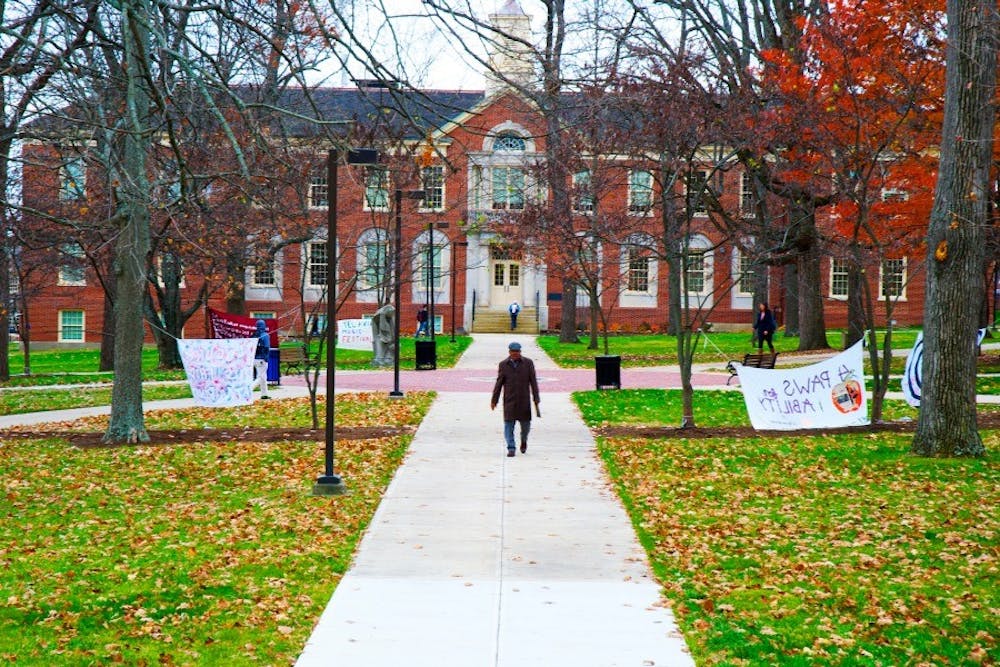The staff of The Miami Student offered a majority opinion editorial in which they suggested wistfully that maybe these tough sexual assault issues should be punted to law enforcement. While I understand why this may seem the most logical solution to a complex problem, it reveals a fundamental misunderstanding of university processes and why they are needed.
The criminal justice "solution" to sexual violence on college campuses completely ignores the fact that the purpose of Title IX is to protect an individual's right to equal educational opportunity, free from gendered violence, harassment and oppression. The criminal justice system does not and cannot do this job.
The criminal justice system does not offer help to the victim, which Title IX requires. In criminal adjudications the victim is really just another piece of evidence.
The criminal justice system (because it threatens the severe sanction of loss of liberty) must utilize a standard of proof and an array of due process protections that greatly favors the alleged perpetrator. The college adjudication is required to treat accused and accuser equally and alike, in recognition of the fact that both parties are fighting for the same property right - the continued ability to attend the college of his or her choice.
Contrary to Brett Milam's assertion that there is "no due process" in campus adjudications, if done correctly, the Department of Education's mandated identical due process for both accuser and accused provides ample procedural safeguards under rulings by the Supreme Court and numerous federal appellate courts. If, as Mr. Milam suggests, Miami University wants to provide equal access to attorneys by both accused and accuser, and works to provide more highly trained personnel to handle these cases, we can all only applaud.
College administrations already have long histories of dealing with criminal acts by one student against another - theft, assault, harassment and property damage, among others. Why is it that we want to take this single type of offense and remove it from university honor courts?
The Miami staff suggests that college administrations will never do a good job of handling these issues because there are so many reasons for administrators to want to hide sexual assault numbers. But rather than strip sexual violence victims of the protections offered by Title IX, why don't we do more to provide administrators with incentives to deal with the problem with transparency and good intentions?
Anonymous campus surveys administered yearly via computer can give us a very accurate assessment of the number of assaults occurring on every campus, a number that administrators would not be able to hide, disguise or dodge. With that concrete number affixed to their college gates, administrators would at last have the incentive to implement every good procedure and program that can help to reduce the quantity of sexualized violence on campus.
The Campus Accountability and Safety Act, a bipartisan bill introduced in the Senate, is pushing for such transparency. If passed, this legislation would require a biannual, standardized survey at every college or university campus in the U.S. Most importantly, it would mandate that the results of this survey be published online.
Miami has already taken the important step of administrating their own survey this spring, and for that they should be applauded. However, it is important to note that this survey is voluntary and internally produced. For a "best practice" measure, advocates recommend implementing a scientifically sound, neutral survey that was created by 22 experts from campuses around the country. The survey is being piloted at several schools this spring, and being offered for free in the fall. Given that impending legislation on campus sexual assault will most likely mandate transparency regardless, why doesn't Miami take proactive measures to be a leader on this issue and adopt the recommended best practices?
The "It's On Us" campaign demonstrated Miami's strong commitment to its students and community, a commitment that must continue past the one week of events. It is on us to do what we can to help student victims of gendered violence, not wring our hands helplessly and send them off to the less-than-tender-mercies of law enforcement.
Nadia Dawisha
dawishnk@miamioh.edu

